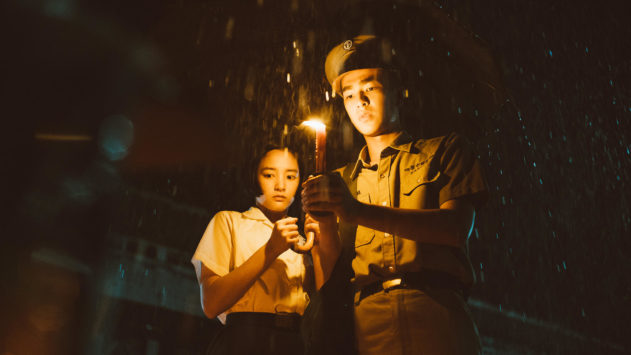Mystery-tinged historical thriller “Fanxiao” (“Detention”) harks back to a dark period of Taiwan’s history
Taiwanese director John Hsu’s first feature length film is a political statement disguised as a historical thriller tinged with moments of horror.
“Fanxiao” (“Detention” in the Mandarin original) is a compelling and generally effective hybrid that walks its characters through the hell of existing in a dystopian society while confronting the difficulties of their reality.
Fang Ray-Shin and Wei Chung-ting are two high school students in 1962 Taiwan. The exist during what was called “The White Terror,” a suppression of political dissidents following a 1947 massacre of innocent citizens. “The White Terror” lasted from 1947 to 1987.
Wei becomes involved with an illegal book club that includes friends and teachers and once he joins, Fang and Wei awake one night in a seeming netherworld within the walls of their school.
It is here where the film explores themes of Buddhism and the different levels of personal suffering, as the two must face their past and escape from their own personal hells.
“Fanxaio” is an ambitious film and Hsu proves himself an adventurous director. His film is a blunt attack on the Taiwanese government and presents their leadership as dictatorial and murderous. Hsu uses the horror aspects of his film to purposely show the tragedy of what citizens went through under that brutal regime.
The film is divided into three chapters, “Nightmare,” “The Whistleblower” and “The Ones Who Lived.” As Hsu’s film slowly reveals its dramatic mysteries, Fang and Wei navigate their ever-darkening school. The memories of what came before and the consequences of their actions are their obstacles, both mentally and physically.
Demons both real and subconscious exist to punish dissenters. Well-designed imagery gives visual power the extreme toll that the “White Terror” took on the people (especially the youth) of Taiwan.
Cinematographer Yi-Hesien Chou crafts a look of existing physical and emotional terror and extreme aggression through shadows and darkness and changing shades of black and red. What lies in those superbly crafted shadows are the ghosts of regret and the monster of consequence.
To my surprise, I found out the film was based on a video game, making my enjoyment of the piece even more surprising, as cinematic adaptations of video games are usually loud and insufferable garbage. If there are a few shortcomings regarding character development, I am sure it can be traced back to the film’s video game roots.
Written by one Shih-Keng Chien, Lyra Fu, and director Hsu, “Fanxiao” is a film that can be thematically compared to Bernardo Bertolucci’s “The Conformist” in its examination of regimes bullying people into betrayal and the mental anguish these dissidents must carry as a burden for their Judas-like actions.
John Hsu’s film is banned in China for its anti-government stance and I am sure the filmmaker wears this as a badge of honor, as his film is a compassionate tale on the socially destructive influence of fascism and the dangers of regimes that come cloaked in patriotism.
Hsu’s work is a film that speaks to many current-day corrupt governments around the world.
It is also a well-crafted excursion into the terror of the mind and soul and the personal decisions that make or break our psyches.
Be it labeled thriller, historical drama or political treatise, “Fangxiao” is a film that works on all levels.
news via inbox
Nulla turp dis cursus. Integer liberos euismod pretium faucibua



